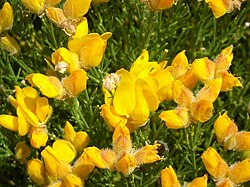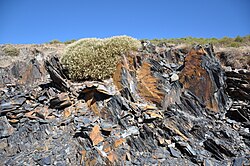Biology:Echinospartum barnadesii
| Echinospartum barnadesii | |
|---|---|

| |
| Echinospartum barnadesii | |
| Scientific classification | |
| Kingdom: | Plantae |
| Clade: | Tracheophytes |
| Clade: | Angiosperms |
| Clade: | Eudicots |
| Clade: | Rosids |
| Order: | Fabales |
| Family: | Fabaceae |
| Subfamily: | Faboideae |
| Genus: | Echinospartum |
| Species: | E. barnadesii
|
| Binomial name | |
| Echinospartum barnadesii (Graells) Rothm.
| |
Echinospartum barnadesii is a species of plant of the Fabaceae family.
Description
Very thorny, rounded, branched shrub, forming cushions close to the ground. Branches are opposite and grooved. Trifoliate opposite leaves, with narrowly lanceolate leaflets. The flowers are at the end of the branches, gathered in tight clusters of 3 to 9. Yellow corolla, butterfly-shaped, with a silky exterior. Flowers during the summer.[1]
Distribution and habitat
In the Iberian Peninsula.[2] In acid soils. Dry, sunny places.
Taxonomy
Echinospartum barnadesii was described by (Graells) Rothm. and published in Botanische Jahrbücher für Systematik, Pflanzengeschichte und Pflanzengeographie 72: 81. 1941.[3]
Etymology
- Echinospartum: generic name derived from the Ancient Greek: echînos; Latinised echinus = "hedgehog, marine and terrestrial, dome of chestnuts, and so on"; and the genus Spartium L. Plants of this genus are often spiny and rounded.[4]
- barnadesii: epithet given in honour of the Spain botanist Miguel Barnades.
Subspecies
Includes two subspecies.
- Echinospartum barnadesii (Graells) Rothm. subsp. barnadesii which occurs only in the Sierra de Gredos, from 1400 to 2250 meters above sea level and is considered a non-threatened endemic.
- Echinospartum barnadesii subsp. dorsisericeum G.López which lives between 750 and 2200 meters above sea level in the mountains of the northwest, centre and south of the Iberian Peninsula.[2]
Synonymy
- Cytisanthus barnadesii (Graells) Gams in Hegi
- Echinospartum lusitanicum subsp. barnadesii (Graells) C. Vicioso ex M. Laínz
- Genista barnadesii Graells
- Genista lusitanica subsp. barnadesii (Graells) C. Vicioso[5]
Common names
In Spanish: acebilla, ardivella, ardivieja, ardiviella, aulaga, bolaga, cambrión, cambronera, cambrón, cambrón, erizo, erizón, escambrión, escambruñeiro, escambrón, espino, espino cambrión, espino cambrón, espino escambrión, espino escambrón, espinu escambrión, gatuña.[5]
References
- ↑ Penas, A.; Diez, J.; Llamas, F.; Rodríguez, M. (in es). Plantas Silvestres de Castilla y León. Valladolid: Ámbito. ISBN 84-86770-40-8.
- ↑ 2.0 2.1 López González, Ginés A. (2007). Guía de los árboles y arbustos de la Península Ibérica y Baleares (3rd ed.). Madrid: Mundi-Prensa. ISBN 84-8476-312-9.
- ↑ "Echinospartum barnadesii". Missouri Botanical Garden. http://www.tropicos.org/Name/13058733.
- ↑ "Flora Vascular". http://www.floravascular.com/index.php?genero=Echinospartum.
- ↑ 5.0 5.1 "Echinospartum barnadesii". Proyecto Anthos. http://www.anthos.es.
Wikidata ☰ Q5816960 entry
 |


